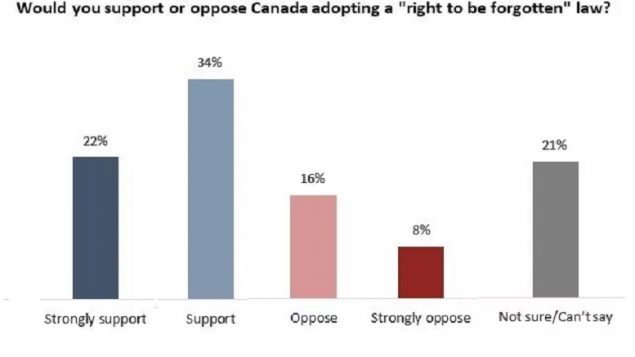The right to privacy vs. the right to free speech access to information
A new poll shows a slim majority of Canadians agree with the concept known as the “right to be forgotten online”. This means the right to have outdated, inaccurate, or no longer relevant information about yourself removed from search engine results.
The poll by the Angus Reid Institute found 51 percent of Canadians agree that people should have the right to be forgotten and aligning themselves with the phrase. “People should have a ‘right to be forgotten’ and have search results changed so this kind of negative information doesn’t dominate their online record forever.”

Angus Reid Inst. 2019
On the other side, some 26 per cent say erasing negative information is erasing history and facts agreeing with the phrase, “Internet searches are a form of public record, erasing negative information – even long past or no longer relevant – is still erasing history and facts
The remainder (23%) were unsure. Interestingly while 51 per cent indicated they believe in the idea, slightly more (56%) said they would support making the right to be forgotten online, enshrined in legislation.
In Europe a Spanish man won his case against Google in 2014 to have information about his financial troubles, long since resolved, removed when people searched his name.
Following a round of consultations he launched in 2016, Canada’s Privacy Commissioner Daniel Therrien, concluded in a draught report earlier this year that Canadians do have that right under the Personal Information Protection and Electronic Documents Act (PIPEDA).
Google says that such a “right to be forgotten” impinges on their right to provide relevant search results to clients and their ability to “discover lawful and legitimate information”.
The Privacy Commissioner is seeking a legal decision from the courts on the rights involved.

Canada’s Privacy Commissioner, Daniel Therrien, (shown in Sept 2016) is looking into the issue. (Canadian Press)
The poll of Canadians found a low percentage were actually familiar with the concept, some 22 per cent on average. The highest familiarity came from the 18-34 age group where 50 per cent were familiar with the idea, and declined from there with age groups until age 55 and older where only 12 per cent were aware of the concept.
Still, quite a few knew of people who had negative information from their past follow them online.
Overall about 18 per cent of Canadians said they knew someone who could benefit from such a right.
Additional information-sources







For reasons beyond our control, and for an undetermined period of time, our comment section is now closed. However, our social networks remain open to your contributions.